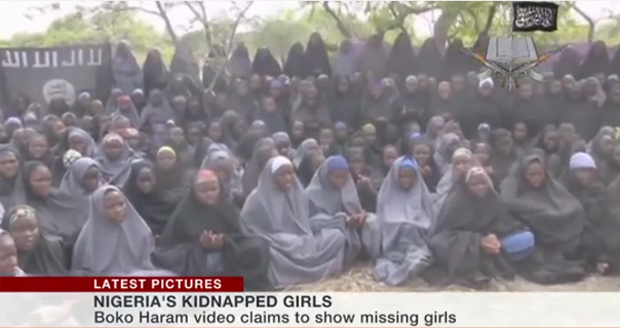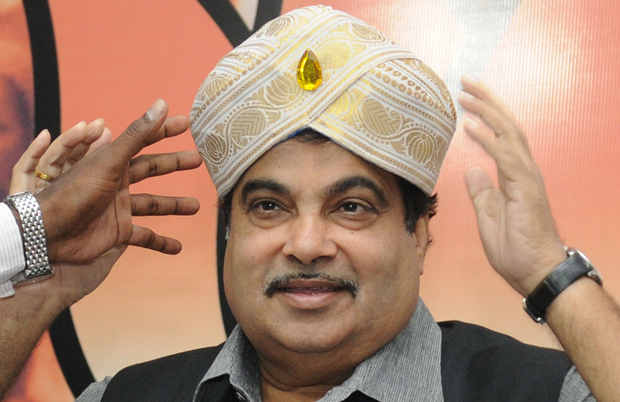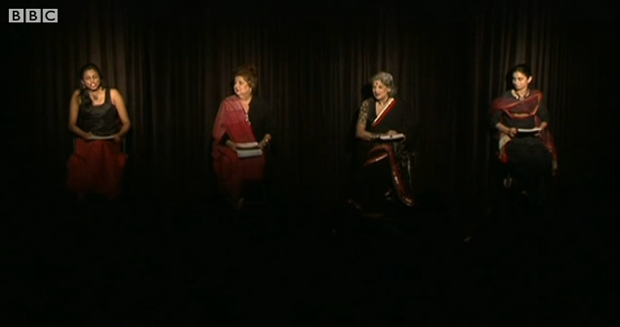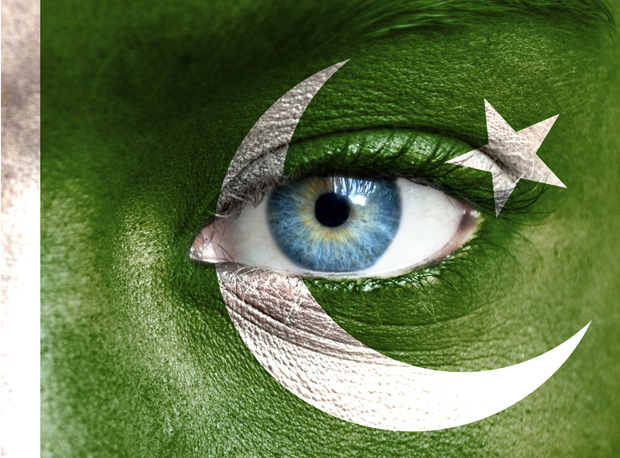3 Jun 2014 | News and features, Nigeria, Politics and Society, Religion and Culture

(Photo: BBC via YouTube)
The Nigerian government has faced criticism over their crackdown on Boko Haram, the terrorist group among other things responsible for the recent kidnapping of around 276 school girls from Chibok in Borno state. The efficiency of the state’s strategy, which has included extrajudicial executions, mass imprisonments and indiscriminate targeting of any young Muslim Nigerian who might fit the profile of a Boko Haram member, has been questioned — and the “war on terror” has also been used to target the country’s journalists.
In the first half of 2013, according to Amnesty International, over a thousand detainees, many of whose affiliation with Boko Haram was never confirmed, died in police detention. The human rights organisation has condemned the government’s crackdown. Borno, Yobe and Adamawa states were put under a state of emergency, countless homes, businesses and mosques were raided, and thousands of men and boys were arrested, loaded into trucks and thrown in prison. According to many of their families, the arrests have been indiscriminate.
In 2009, Nigerian police claimed the killing of Mohammed Yusuf, the leader of Boko Haram at the time. The government said Yusuf, who was blamed for violence that killed hundreds of people in northern Nigeria, was shot dead following his capture. The official line was boldly unrepentant about the lack of judicial process. “He has been killed. You can come and see his body at the state police command headquarters,” said Isa Azare, spokesman for the police command in the northern city of Maiduguri.
In 2010, footage obtained by Al Jazeera showed deceased and unarmed Boko Haram prisoners who appeared to have been killed by government troops after “crackdown” fighting had ended. Elements of the police and army reportedly staged a follow-up operation in which house-to-house searches were conducted and individuals were apparently selected at random and taken to a police station.
The efficiency of the government’s strategy to eliminate Boko Haram has been severely questioned by security experts.
“So many young men were killed and beaten in the crackdown against Boko Haram,” said Virginia Comolli, Research Fellow for Security and Development at the International Institute for Strategic Studies, “ that police or soldiers might have developed sympathies for the group, if one of their relatives was caught up in this.”
“You wonder whether there could be complicity,” Comolli speculated.
Bala Liman, a PhD candidate at School of Oriental and Africa Studies in London and an expert on Boko Haram, pointed to further flaws in the crackdown. “Look at the $8 billion which was provided to the security forces in 2011,” he said, “most of the money was lost to corruption rather than going to fight Boko Haram. Most of the soldiers I speak to nowadays are still under-equipped.” With corruption so widespread, Liman also suggested that bribery could have been a motivation behind collusion with Boko Haram.
While international observers may have the luxury of pointing out the fallacies in such a brutal crackdown, as well as corruption (or sheer incompetence) amongst the police and military, Nigerian journalists do not: Security agents have abused the pretext of their own “war on terror” to threaten, harass, arrest, detain, and seize the equipment of local reporters.
In one case in December 2013, security forces assaulted broadcast journalist Yunusa Gabriel Enemali on the pretext he was a Boko Haram suspect, after he took photographs of a policeman demanding a bribe. “I was fortunate to come out alive,” Enemali told the Committee to Protect Journalists at the time.
In December 2012, the State Secret Service (SSS) unlawfully detained and seized the equipment of Aliyu Saleh, a reporter with the weekly Hausa-language Al-Mizan newspaper, and Musa Muhammad Awwal, the paper’s editor, allegedly over a story questioning the government’s extra-judicial imprisonment of people in Northern Nigeria.
Peter Nkanga, the Commitee to Protect Journalist’s West Africa correspondent, told Index on Censorship: “Awwal was twiced arrested and on both occasions had his equipment seized by the State Security Service. It is now over a year ago yet the SSS have refused to return his two laptops and two phones, alongside five other phones seized from his wife and children.”
Journalists covering protests since the kidnap of the Chibok schoolgirls have also been targeted. Hir Joseph of the independent Daily Trust newspaper was arrested on 9 May after he wrote a story detailing how female police officers and other security officers had joined with protesters calling on the government to do more to rescue the girls.
“Joseph refused to disclose his source for a story,” Nkganga told Index. While in custody, two police officers kicked Joseph, locked him in a cell “with hardened criminals” and was also told to simulate sex with a wall while being interrogated. The police charged Joseph in court on 12 May, accusing him of publishing “injurious falsehood”. Joseph pleaded not guilty and the case has been adjourned to 19 June. He faces up to two years imprisonment if convicted.
“Targeting a journalist for reporting on issues of public interest,” says Nkganga, “is tantamount to deliberately denying the public the right to be adequately informed about issues affecting their commonwealth. This is an attack on the society. By extension, this goes against the freedom of expression Nigerians are universally and constitutionally guaranteed.”
This article was posted on June 3, 2014 at indexoncensorship.org
29 May 2014 | India, News and features, Politics and Society

Nitin Gadkari, a politician with a chequered, if not dubious record of integrity and probity, had a political opponent arrested for slander. (Photo: Amit Kumar/Demotix)
Once, President Lyndon Johnson was caught in the crossfire of an anti-Vietnam war protest. A placard was shoved in his face: “LBJ pull out, like your daddy should have done.” Sure, LBJ got the pun, as would have Anthony Weiner in our present times, but he remained unperturbed. Consider Lady Violet Bonham Carter’s biting repartee to an irresolute Sir Stafford Cripps, saying he “has a brilliant mind — until it is made up”.
Mordant wit is what makes politics and political debates sparkle with brilliance, besides deflating windbags and putting stuffed shirts in their place. Even if the “sourcasm” is discounted, plainspeak and no-holds barred verbal duels contribute in no small measure to ensuring accountability, for who isn’t mortally petrified of lacerating criticism?
Turns out that in India, folks with brittle egos and skeletons stacked up in their closets, can and will wield the law to clam a critic’s mouth shut, and even have them put in jail. And this is irrespective of resorting to some risqué puns.
Arvind Kejriwal, founder of the Aam Aadmi (Common Man) Party, who is out on a limb to eradicate the scourge of corruption, realised this to his peril when Nitin Gadkari, a politician with a chequered, if not dubious record of integrity and probity, had him arrested for slander. Slander? No, Gadkari wasn’t invoking some law of the Middle Ages or the Victorian Era. He was merely invoking Sections 499 and 500 of the Indian Penal Code which criminalise defamation, both in writing as well as verbal statements. Kejriwal called Gadkari “corrupt” because not very long ago, the latter did come under the scanner for alleged massive illegalities in his business dealings, but managed to wriggle out since no legal investigation or prosecution were launched.
These two provisions are so broad in scope that every insinuation, unless proved to have been made in “good faith”, can land someone in prison. Someone like Kejriwal, who was incarcerated for six days until he was let out on bail yesterday. Now how does one prove “good faith”, that too, “beyond reasonable doubt”, since that remains the standard of proof in criminal law? Worse, a person can be taken into custody even while this seemingly Herculean task is getting done.
As if criminalisation of libel isn’t bad enough, punishing “slander” grants almost instant impunity if one is strategic enough. Take Kejriwal’s example, again. In October and November last year, he addressed a press conference and read out from a list of charges against business tycoon Mukesh Ambani. The businessman lost no time in slapping legal notices against every television channel which broadcast the conference. Libel chill, without a shred of doubt, for all the channels went silent. Whether Ambani’s fleece is as white as snow isn’t the question; his dark deeds of pulverising criticism are, and deserve the most trenchant critique.
It is encouraging to note that already demands are being made for decriminalising libel, but unless slander is banished from the statute books, dangers would continue to lurk. The Law Commission of India has taken a laudatory and timely step by releasing a consultation paper which seeks to unshackle the media from apprehensions of libel chill. But what happens to individuals — political activists, or whistleblowers? A possible solution lies in Gertz v. Robert Welch, Inc. wherein the Supreme Court of the United States extended the Sullivan privilege (named after the legendary NYT v. Sullivan case) — that only statements made with naked malice or reckless disregard for the truth shall be held as defamatory — available to media houses, to certain categories of individuals also. Those “seeking governmental office” and those who “occupy positions of such persuasive power and influence that they are deemed public figures for all purposes” were accorded protection. Recently, this has been adopted in international money laundering law of PEPs or Politically Exposed Persons. It includes, “individuals who are or have been entrusted domestically with prominent public functions, for example, heads of state or of government, senior politicians, senior government, judicial or military officials, senior executives of state-owned corporations, important political party officials”.
Back in 2011, the UNHRC (United Nations Human Rights Committee) issued a declaration condemning Philippines’ provisions of criminal libel as a violation of the ICCPR. One hopes India wouldn’t require such a slap on the wrists to amend the repugnant law which rewards dishonest claims of calumny.
This article was published on May 29, 2014 at indexoncensorship.org
27 May 2014 | India, News and features, Politics and Society, Religion and Culture

The Vagina Monologues performed in Mumbai in 2013 (Photo: BBC News)
“If Chennai doesn’t have vaginas, it is full of a#*holes!” quipped Mahabanu Mody Kotwal in the opening act of The Vagina Monologues when it was staged in Mumbai. The veteran theatre actor and director had good reason for using the pun. In December 2010, when the play was to be staged in the city for the first time, the Police Commissioner played spoilsport at the eleventh hour and declined permission. Earlier this year, a play on the Partition of India wasn’t allowed to be staged in Bangalore, and yes, Chennai. In both cases, it was the police which called the shots in the cancellations. Theatre’s subversive and liberating potential is renowned, and governments the world over have never held themselves back from wielding the censor’s bludgeon, but in India, it is the police which has been vested with remarkably sweeping powers to crack down on theatrical performances.
However, Chennai’s travails might well be over because in January this year, the Supreme Court struck down those provisions of the legislation – The Tamil Nadu Dramatic Performances Act, 1964 which permitted the cops to be the sole arbiters of “suitable” drama in the first place.
The roots of this legislation go back to the days when India was under British rule and the colonial administration remained constantly paranoid about “the natives” being up to mischief. Their fears were precipitated in 1876, when a Bengali play “Neel Darpan” (A Mirror to Indigo) was staged in Calcutta and got a rousing response, even from many Englishmen. The play narrated how farmers in Bengal and other provinces were being forced to cultivate indigo, and if they refused, were meted out the most terrible of punishments. This made the livid rulers who termed the play “scurrilous”, enact a law “to empower the government to prohibit certain dramatic performances”. The stated object of this law was to “prohibit Native plays that are scandalous, defamatory, seditious, obscene, or otherwise prejudicial to public interest”. Of course, “otherwise prejudicial to public interest” was left undefined, further empowering the censors.
It was hoped that independence would free drama from the shackles of this repressive law, but the reverse happened. Different states in India brought in their own legislations to control theatre, and most of them tightened the grip more than the British ever did.
For instance, the present legislation was geared towards proscribing “objectionable” plays and pantomimes. Section 2 (1) defined “objectionable” as anything which was likely to:
be seditious
(i) incite any person to commit murder, sabotage or any offence involving violence; or
(ii) seduce any member of any of the armed forces of the Union or of the police forces from his allegiance or his duty, or prejudice the recruiting of persons to serve in any such force or prejudice the discipline of any such force;
(iii) incite any section of the citizens of India to acts of violence against any other section of the citizens of India;
(iv) is deliberately intended to outrage the religious feelings of any class of the citizens of India by insulting or blaspheming or profaning the religion or the religious beliefs of that class;
(v) is grossly indecent, or is scurrilous or obscene or intended for blackmail; and includes any indecent or obscene dance.”
Thus, one is left in no doubt that the only form of ‘non-objectionable’ theatre would be bland, pantomimes extolling the virtues of mythology and religion; even then, one could never be sure, because religious sentiments in India are nothing short of a communal tinderbox.
If these antediluvian definitions weren’t enough, the police could act against the producer, director, troupe, and even the person who either owned or let out the premises where the play was to be staged. And there lurked the gravest danger- carte blanche powers of pre-censorship. Scripts of plays were to be submitted to the police for approval, and even though an opportunity of hearing was provided before the final call could be taken, it was hollow formality because the history of the legislation’s implementation proves that permission was granted only when the director or the playwright agreed to some of the mandated excisions.
In fact, the government was so unwilling to relinquish control that it told the Court of its willingness to appoint an officer to “guide the police commissioner in the cultural nuances” since literary sensibilities aren’t usually policemen’s forte!
The Supreme Court has broken the police’s stranglehold in Tamil Nadu; the time is ripe for challenging similar laws proscribing dramatic performances in other states and restoring to theatre the freedom it always deserved.
This article was posted May 27, 2014 at indexoncensorship.org
23 May 2014 | News and features, Pakistan, Politics and Society, Religion and Culture

(Image: Aleksandar Mijatovic/Shutterstock)
Shahidullah Afridi’s roots are in a village in the Bara administrative division of the Khyber agency. For the last four years, Afridi has been living in the neighbouring city of Peshawar, but keeps a keen eye on events at home.
He was shocked when he heard that last week, the outlawed militant group, Lashkar-e-Islam (LI) had started a rather strange recruitment drive in his village that asked residents to enrol at least one of their sons to madrassas run by LI or pay Rs 400,000 (£2,397.96) as penalty.
Afridi is glad he left when he could. “I have a five-year old son. I don’t want my son to study in a madressa. I didn’t and I consider myself a fairly good Muslim,” he said, adding: “If you don’t study in a school [as opposed to a madressa], you don’t find work.”
The news was confirmed by Zahir Shah Sherazi, Dawn TV’s bureau chief in Peshawar who also reports on FATA and KPK. “My sources tell me that A4 sized posters have been plastered all over the marketplace in the Malik Din Khel area, controlled by LI, demanding locals put their sons into the seminaries run by them,” he told Index, adding: “They also said admission in madrassas other than theirs would not be acceptable.”
Afridi has not visited his village since he left. “I neither sport a beard nor do I wear a skull cap,” he told Index by phone from Peshawar, where he works as a daily wage earner.
Ambreen Agha, a research assistant with New Delhi’s Institute for Conflict Management, said Mangal Bagh assumed the leadership of LI in 2007, emerging as a new face of extremism and Islamic fundamentalism. “He imposed his version of the Shariah, issuing diktats against women’s education, making it compulsory for men to keep beards and forced women to wear burqa.”
Neither the Pakistani government nor the army took any actions.
“It shows the incompetency of the establishment,” said Agha, adding: “Eight years of Bagh’s control of the area says enough about the will of the Pakistani state in dealing with the militants. ”
To Farahnaz Ispahani, public policy scholar with the Washington D.C. based-Woodrow Wilson Centre and a former parliamentarian, it’s a “reflection of the virtual end of pluralism and choice in Pakistan”.
“Extremist ideology has partnered with criminality; the so-called Lashkar-e-Islam is engaging in mafia-like extortion but seeking respectability as an Islamist insurgent group,” she told Index.
Sherazi terms Bagh a “criminal” adding that his is not an ideological fight. “He is just doing business — in drugs,” he said.
Journalist Taha Siddiqui, winner of this year’s Albert Londres Prize, has travelled extensively in the area controlled by Bagh as well as written about militancy. Siddiqui told Index: “Locals that I have spoken to tell me that the smuggling trade from Bagh’s area is most lucrative.”
But why has the state allowed Bagh to flex his muscles with such impunity?
Khyber agency is on the last leg of the NATO supply route before it enters Afghanistan. Siddiqui says it suits the Pakistani security establishment to keep the area lawless. “It helps to keep it infested with militants — and using the latter as proxies to keep the pressure on NATO when it’s exiting.”
In addition, he said, Pakistan had often hinted at acquiring the leftover military equipment. “What better way to have their way if the ISAF does not cooperate — keep attacking the supply route — and that is only possible if they have proxies there,” he explained.
At another level, Siddiqui said the state is using militancy to achieve some other objectives. “They created Ansar ul Islam [another banned militant group] to counter LI in Khyber agency. To me, it proves that they do not want to eradicate militancy, but keep arming one group to disarm the others, especially those who have turned against them.”
Bagh’s enrolment ultimatum is just another example of how emboldened the militant outfits have become and in comparison how weak the Pakistani state appears.
However, there is time still and if the state is sincere in protecting the next generation of children from embracing militancy, Siddiqui said, the civilian government should ask the military what it has been doing in Khyber agency for almost half a decade. “If it’s fighting militancy, then this should not be the result. On the other hand, if it is not, those responsible should be held accountable and heads should roll so that an effective counter-terrorism policy is actually implemented which is not limited to paying lip-service to gain international sympathy and aid through deceit and cheating that Pakistan has come to be known for.”
This article was posted on May 19, 2014 at indexoncensorship.org




